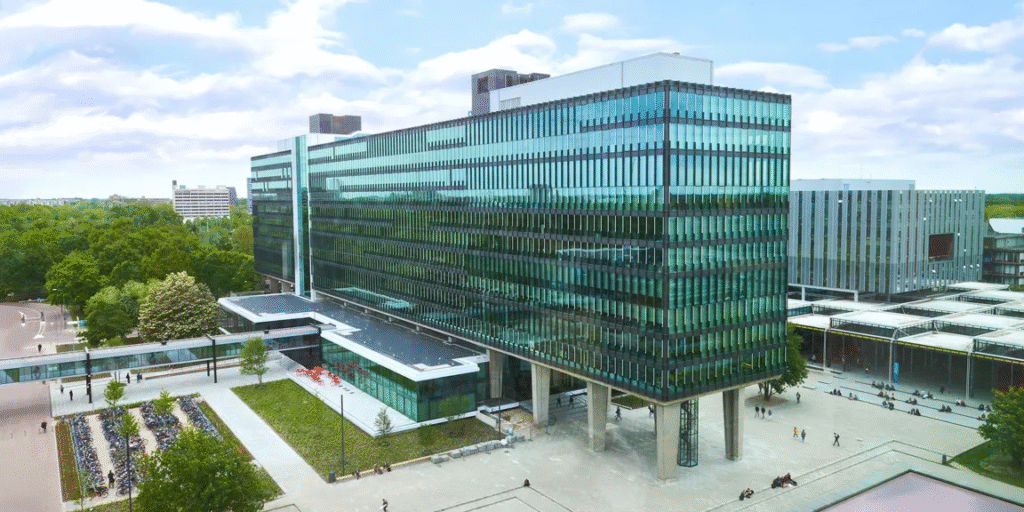Eindhoven University of Technology (TUE)
occupies the center of the Netherlands’ high-tech industry cluster. The university has been at the forefront of developing the Dutch knowledge economy over the last 60 years.

Established in 1956, TUE was originally set up to provide highly qualified graduates to electronics giant Philips for its world-famous laboratories. These labs were credited with developing ground-breaking technologies like the first video and audio cassettes, CD players, and laserdisc players.
Although TUE continues to have close links with Philips, its relationship with other companies in the ‘Brainport’ region—the informal name for the Dutch Silicon Valley—has become equally significant. Major companies such as ASML, NXP, DAF Trucks, DSM, and various Dutch research institutes are based there, and it is the most patent-rich area in Europe.
TUE: The research institutes of TUE, e.g., Intelligent Lighting Institute, Data Science Center Eindhoven, the Institute for Complex Molecular Systems, and the Materials Technology group, have strong industry ties. Its research addresses areas such as automotive systems, broadband telecommunications, information systems, nano-engineering, and polymers, with main fields of research interest being energy, health, and intelligent mobility.
The university is also famous for its success in the field of robotics. TUE has consistently performed well in RoboCup, an annual international competition in which soccer-playing robots from universities across the globe compete. In 2019, TUE won its third world championship, its ninth in a row as it reached the final.
TUE students made headlines in 2016 by inventing the world’s first “drone café,” in which alcoholic beverages were delivered to customers by flying drones.
Some of the other fields of excellence at TUE are data science, high-tech systems, and photonic integration.

TUE has a medium-sized campus with around 5,000 undergraduate students, 3,200 master’s students, and 1,200 PhD students. The university teaches courses in English and Dutch languages, such as Dutch for beginners for international students.
Sports are an important part of university life, with the university providing 70 different sports through many student-led societies. These include activity clubs for mountain climbing, taekwondo, windsurfing, and snowboarding.
The TUE Library, in the MetaForum building at the heart of the campus, provides almost 1,000 study seats, all of which are fitted with wireless internet access.
Rankings
World University Rankings 2025: Ranked 185th
Arts and Humanities 2025: Ranked 126-150th
Computer Science 2025: Ranked 82nd
Engineering 2025: Ranked 81st
Physical Sciences 2025: Ranked 201-250th
Social Sciences 2018: Ranked 151-175th
Impact Rankings 2025:
Overall: 601-800th
Good Health and Wellbeing: 601-800th
Quality Education: 1001-1500th
Affordable and Clean Energy: 401-600th
Industry, Innovation, and Infrastructure: 34th
Sustainable Cities and Communities: 301-400th
Responsible Consumption and Production: 101-200th
Partnership for the Goals: 1501+
Student Stats
Gender Ratio: 25% Female : 75% Male
International Student Percentage: 31%
Students per Staff: 21
Total Students: 10,686
Subjects Offered at TUE:
Arts and Humanities: Archaeology, Architecture, Art, Design, History, Philosophy, Languages, Literature, and Linguistics
Engineering: Chemical Engineering, Civil Engineering, Electrical Engineering, Mechanical and Aerospace Engineering
Physical Sciences: Chemistry, Geology, Environmental Science, Mathematics, Physics, Astronomy
Computer Science: Computer Science
